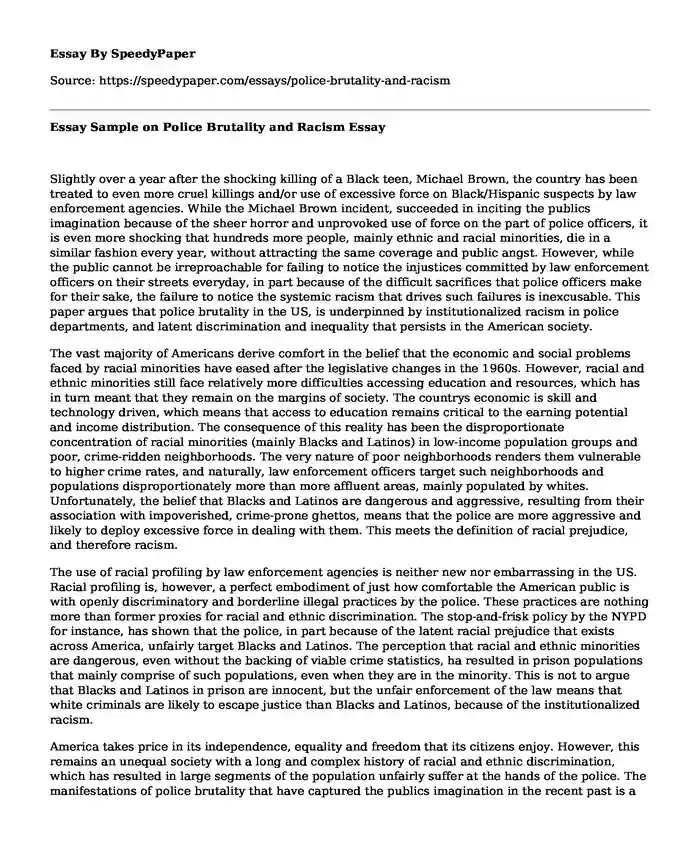
| Type of paper: | Essay |
| Categories: | Racism Violence Police Police brutality |
| Pages: | 3 |
| Wordcount: | 619 words |
Slightly over a year after the shocking killing of a Black teen, Michael Brown, the country has been treated to even more cruel killings and/or use of excessive force on Black/Hispanic suspects by law enforcement agencies. While the Michael Brown incident, succeeded in inciting the publics imagination because of the sheer horror and unprovoked use of force on the part of police officers, it is even more shocking that hundreds more people, mainly ethnic and racial minorities, die in a similar fashion every year, without attracting the same coverage and public angst. However, while the public cannot be irreproachable for failing to notice the injustices committed by law enforcement officers on their streets everyday, in part because of the difficult sacrifices that police officers make for their sake, the failure to notice the systemic racism that drives such failures is inexcusable. This paper argues that police brutality in the US, is underpinned by institutionalized racism in police departments, and latent discrimination and inequality that persists in the American society.
The vast majority of Americans derive comfort in the belief that the economic and social problems faced by racial minorities have eased after the legislative changes in the 1960s. However, racial and ethnic minorities still face relatively more difficulties accessing education and resources, which has in turn meant that they remain on the margins of society. The countrys economic is skill and technology driven, which means that access to education remains critical to the earning potential and income distribution. The consequence of this reality has been the disproportionate concentration of racial minorities (mainly Blacks and Latinos) in low-income population groups and poor, crime-ridden neighborhoods. The very nature of poor neighborhoods renders them vulnerable to higher crime rates, and naturally, law enforcement officers target such neighborhoods and populations disproportionately more than more affluent areas, mainly populated by whites. Unfortunately, the belief that Blacks and Latinos are dangerous and aggressive, resulting from their association with impoverished, crime-prone ghettos, means that the police are more aggressive and likely to deploy excessive force in dealing with them. This meets the definition of racial prejudice, and therefore racism.
The use of racial profiling by law enforcement agencies is neither new nor embarrassing in the US. Racial profiling is, however, a perfect embodiment of just how comfortable the American public is with openly discriminatory and borderline illegal practices by the police. These practices are nothing more than former proxies for racial and ethnic discrimination. The stop-and-frisk policy by the NYPD for instance, has shown that the police, in part because of the latent racial prejudice that exists across America, unfairly target Blacks and Latinos. The perception that racial and ethnic minorities are dangerous, even without the backing of viable crime statistics, ha resulted in prison populations that mainly comprise of such populations, even when they are in the minority. This is not to argue that Blacks and Latinos in prison are innocent, but the unfair enforcement of the law means that white criminals are likely to escape justice than Blacks and Latinos, because of the institutionalized racism.
America takes price in its independence, equality and freedom that its citizens enjoy. However, this remains an unequal society with a long and complex history of racial and ethnic discrimination, which has resulted in large segments of the population unfairly suffer at the hands of the police. The manifestations of police brutality that have captured the publics imagination in the recent past is a consequence of the latent racism in police departments, which is in turn a consequence of the latent racial discrimination across the country. For as long as the majority of people condone these practices, it is unlikely that police brutality will end soon.
Cite this page
Essay Sample on Police Brutality and Racism. (2019, Jun 24). Retrieved from https://speedypaper.net/essays/police-brutality-and-racism
Request Removal
If you are the original author of this essay and no longer wish to have it published on the SpeedyPaper website, please click below to request its removal:
- Long Term Effects of Divorce on Children, Free Essay in Psychology
- Anatomy Essay Assignment
- Nursing Essay Sample: The Effects of Post-operative Environments
- Essay Sample on Word Painting in Renaissance Vocal Music
- Fighting Terrorism in Afghanistan, Free Essay Sample
- Free Essay Sample on Mock Counselling Role
- Essay Example about Interpersonal Communication and Social Media
Popular categories




